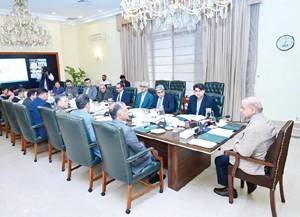
Shehbaz Sharif chairs special meeting to review measures being taken to tackle spread of mpox virus. No local transmission of mpox detected in Pakistan, PM told. PM’s Coordinator says no need to panic. Only one case of mpox detected in Pakistan: Dr Mukhtar. Health minister says no mpox case reported in Punjab. WHO seeks mpox vaccine production surge.
ISLAMABAD/LAHORE/GENEVA – Prime Minister Shehbaz Sharif on Saturday directed the authorities to enhance the effectiveness of mpox (Monkeypox) screening systems at the country’s airports, seaports, and borders.
While chairing an important meeting on the measures being taken against the spread of mpox virus, the prime minister directed for ensuring effective screening measures at all airports, seaports and borders of the country, besides asking the border health services to keep complete surveillance of the situation.
He also directed the National Command and Operations Center (NCOC) to keep alert and hold daily evaluations of the situation and asked for the provision of all required gadgets and kits for the evaluation of mpox virus.
The meeting was attended by PM’s Coordinator on National Health Dr Malik Mukhtar Ahmad Bharath, Federal Secretary National Health Nadeem Mehboob, Chairman National Disaster Management Authority (NDMA) Lt. Gen. Inam Haider Malik, chief secretaries, chief commissioner ICT and other relevant senior officials, PM Office Media Wing said in a press release.
The prime minister further directed for strengthening of coordination among the provincial governments, governments of Gilgit Baltistan and Azad and Jammu Kashmir. He asked for the launch of an effective and complete awareness campaign, besides hinting at getting weekly briefings over the mpox situation.
The meeting was apprised of the situation about the spread of the monkeypox virus. A person in District Mardan was diagnosed as a carrier of the virus. The resident had just returned to Pakistan from abroad where he was employed. He was quarantined and his condition was out of danger, the meeting was further apprised.
It was told that no local transmission of mpox was detected in Pakistan. The WHO, on August 14, declared the spread of mpox virus a public health emergency after which the NCOC issued a national advisory. The required instructions in this regard had been issued, the meeting was briefed.
The federal and provincial governments were launching awareness drives in this regard, whereas the Civil Aviation Authority (CAA) would supervise the flights arriving from abroad. The provincial governments, governments of Gilgit Baltistan, Azad Jammu and Kashmir and Islamabad Capital Territory administration had allocated isolation wards and beds in the largest hospitals for the possible mpox virus cases.
All the precautionary measures were in place, it was further added.
‘No need to be panic’
After the confirmation of the first case of monkeypox in Khyber Pakhtunkhwa (KP), the federal government on Saturday urged the masses to exercise caution and not to panic as the mortality rate of the virus was low. Addressing a press conference here, Prime Minister’s Coordinator on National Health Services Dr Mukhtar Ahmad said that there is no need to be panic as only one case of mpox has been detected in Pakistan.
He said that the virus was detected in 99,000 people in the world of which only 200 patients died and the rest recovered.
The PM’s coordinator pointed out that the person, who tested positive for the virus in KP, recently returned from the Gulf region. He added the detection prompted action by the authorities concerned, which isolated the family members of the affected person.
“The government has formulated a comprehensive strategy to protect the citizens from the virus,” Dr Ahmad said, adding that surveillance and screening are in place at all airports and points of entry.
In the provinces including the federal capital, he noted, laboratories are allocated for diagnosing Mpox. Ahmad said travellers coming from Africa, the United States (US) and the Gulf countries will undergo screening.
He said that under the leadership of Prime Minister Shehbaz Sharif, Centre and the provinces have taken steps on a priority basis to stop the potential spread of the disease.
The PM’s aide said that the Ministry of Health is ensuring continuous monitoring daily and the government is closely monitoring the situation.
Dr Mukhtar said that the ministry is in full contact with the provinces and on the instructions of the prime minister a meeting is being held on a daily basis.
He urged the people to isolate themselves at home if their family has a travel history or Mpox symptoms. “In such a situation contact a qualified doctor and follow the doctor’s instructions in case of having any such symptoms.”
He said that symptoms may take 10 to 15 days to appear and spending too much time with the patient can spread it. “It is better if the patient is quarantined,” he said, adding that fever medicines are used for Mpox.
‘No case of monkeypox reported in Punjab’
Also, Punjab Health Minister Khawaja Salman Rafique has announced that no case of monkeypox has been reported in Punjab so far, while an alert has been issued to the authorities concerned.
The announcement came after a high-level working group meeting was held on Saturday, led by Provincial Health Ministers Khawaja Salman Rafique and Khawaja Imran Nazir. The meeting was held to review the current situation regarding the monkeypox virus.
The meeting saw participation from key stakeholders, including officers, medical experts, representatives from the World Health Organization (WHO), civil aviation authorities, and other technical experts. Discussions focused on precautionary measures, diagnosis, and treatment protocols to combat the potential spread of the monkeypox virus.
In line with WHO guidelines, it was decided that health care workers in isolation wards would be vaccinated as a first step in preventing any outbreaks. Minister Khawaja Salman Rafique emphasized that Standard Operating Procedures (SOPs) are being prepared to respond swiftly to any potential cases of monkeypox.
Khawaja Imran Nazir reassured the public, stating, “There is no immediate threat from monkeypox, but caution is necessary.” He also noted that airport authorities have been instructed to screen passengers for the virus, and the Institute of Public Health (IPH) has been directed to train master trainers for this purpose.
During the meeting, Dean of the Institute of Public Health, Professor Zarfashan Tahir, briefed participants on the status of monkeypox, Zika virus, and other infectious diseases. Instructions were also given to alert and provide advanced training to healthcare staff in isolation wards at six selected government hospitals.
The meeting included the presence of Special Secretary Muhammad Iqbal, Additional Secretaries Dr. Yunus and Dr. Waseem, Director CDC Dr. Yadullah, WHO representative Dr. Jamshed, Dr. Khalil, and other officials.
WHO seeks mpox vaccine production surge
The World Health Organization on Friday urged manufacturers to ramp up production of mpox vaccines to rein in the spread of a more dangerous strain of the virus.
The WHO on Wednesday declared the mpox surge a public health emergency of international concern — its highest alert level — with Clade 1b cases soaring in the Democratic Republic of Congo and spreading beyond its borders.
“We do need the manufacturers to really scale up so that we’ve got access to many, many more vaccines,” WHO spokeswoman Margaret Harris told reporters.
The WHO is asking countries with mpox vaccine stockpiles to donate them to countries with ongoing outbreaks.
Two mpox vaccines have been used in recent years — MVA-BN, produced by Danish drugmaker Bavarian Nordic, and Japan’s LC16.
Harris said there were 500,000 MVA-BN doses in stock, while an additional 2.4 million doses could be produced quickly, if there was a commitment from buyers.
For 2025, an additional 10 million doses could be produced, upon a firm procurement request.
“LC16 is a vaccine that is not commercialized but produced on behalf of the government of Japan. There is a considerable stockpile of this vaccine,” Harris added, saying the WHO was working with Tokyo to facilitate donations.


